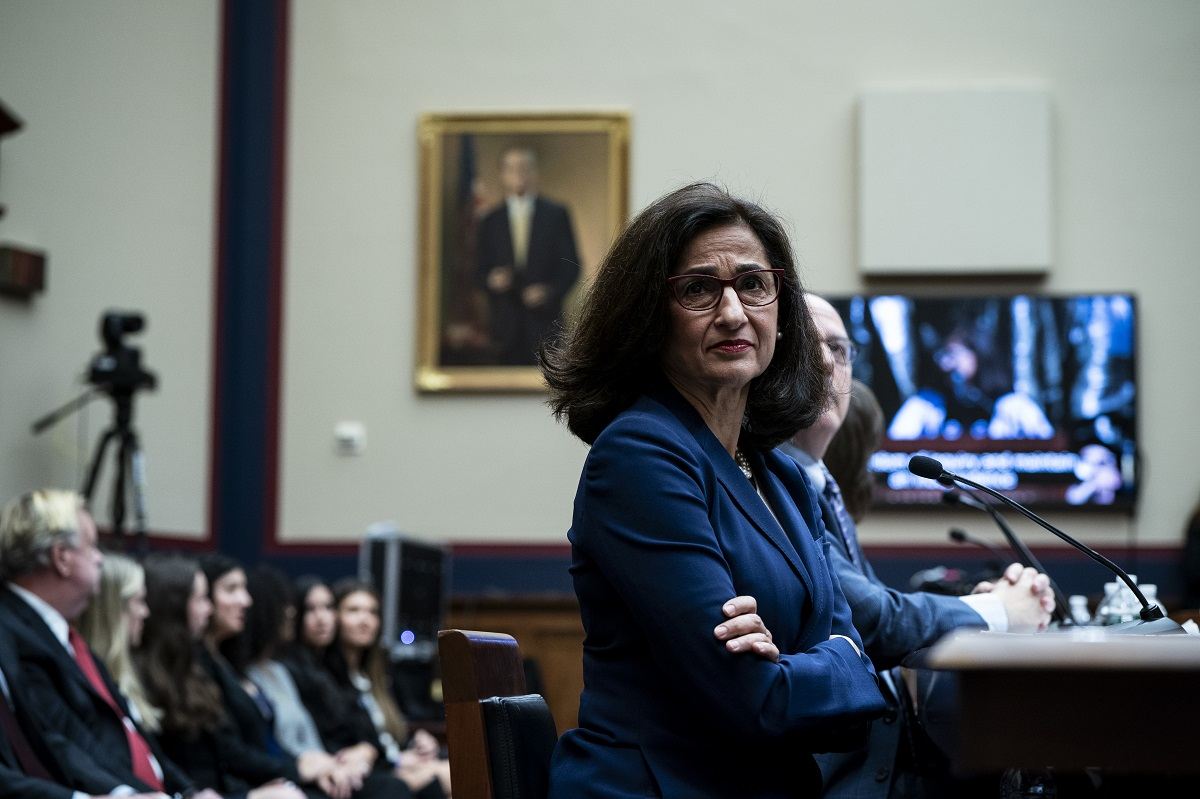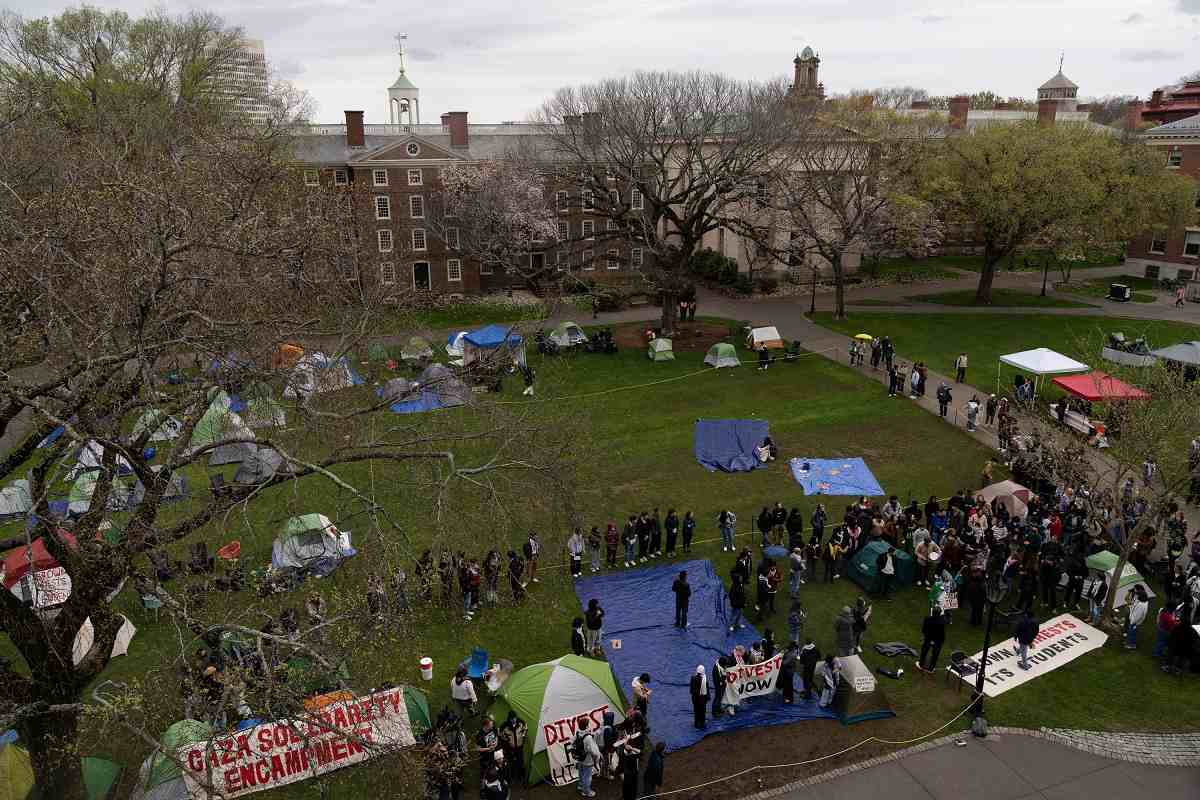
Minouche Shafik, the president of Columbia University, testified before Congress last week.
13:23 JST, April 25, 2024
The arrest of 100 antiwar protesters at Columbia University on Thursday sparked a new wave of campus unrest. Demonstrators set up encampments at colleges spanning the nation, with students demanding that their universities cut ties or reveal their involvement with corporations doing business with Israel or profiting off the war in Gaza.
This is how the burgeoning protest movement started, escalated and spread – and where it might go from here. Commencements for the class of 2024 begin in weeks.
An ongoing protest at Columbia
Last Wednesday, protesters set up tents on the South Lawn of Columbia University and flew Palestinian flags. They held demonstrations in which they chanted, banged on noise makers and denounced the “genocide” in Gaza.
But around midafternoon the next day, New York police began breaking up a protest at Columbia, arresting demonstrators who had occupied a campus lawn in support of Palestinians.
This came at the request of Columbia President Minouche Shafik, who had written to the New York Police Department earlier in the day to tell them that protesters had been trespassing on the South Lawn of the university’s Morningside Heights campus and represented “a clear and present danger to the substantial function of the University.”
She requested that the department send officers to campus to remove them. In total, 108 were arrested.
The protest came a day after Shafik testified before Congress, pledging to lawmakers during a hearing on antisemitism to balance students’ safety with their right to free speech.
Shafik told members of the House Committee on Education and the Workforce that balancing the free speech rights of those who want to protest with the rights of Jewish students to be free of harassment and discrimination at Columbia has been the central challenge on campus. Her hearing followed one in December in which three other university presidents – from Harvard, the University of Pennsylvania and MIT – were scrutinized over their testimony before Congress, during which they declined to say calls for the genocide of Jews would violate campus policies. The leaders of Harvard and Penn later resigned.
After the arrests last week, protesters reconvened on the West Lawn and have been camping there ever since.
Late Tuesday, administrators set a midnight deadline for them to clear out but extended it by 48 hours early Wednesday, citing “important progress” in negotiations with protest organizers.
More student antiwar protests
Starting Monday, protests sprang up at college campuses across the country, including at New York University, the University of North Carolina at Charlotte and the University of Michigan.
At Yale, 47 students were arrested. Officers gave one warning around 6 a.m. and within minutes began arresting protesters who had been camped out on Beinecke Plaza.
Those students were charged, processed and released – and almost all of them reconvened at an off-campus intersection near Beinecke to join hundreds of others to continue their protest as New Haven police blocked the intersection and looked on.
Meanwhile, on Monday night, 120 protesters were arrested at NYU’s campus.
And on the West Coast, students at California State Polytechnic at Humboldt barricaded themselves inside a building, the campus went on lockdown, and administrators eventually closed the campus through Wednesday; the university urged people to stay away from the “dangerous and volatile situation” at the hall and said it was “deeply concerned about the safety of the protesters.”
Where will the antiwar protests go next?
The drumbeat of antiwar protests has not been steady. Tuesday was relatively quiet compared with Monday, but with protests in Texas and California on Wednesday, it’s possible that encampments won’t be leaving college campuses anytime soon. In fact, more could be cropping up.
Columbia’s protests and the ones that followed inspired Merlin Van Alstine, a University of Minnesota student and an organizer with the school’s chapter of Students for a Democratic Society, and about 30 other students to set up their own encampment. By Tuesday morning, nine of her fellow demonstrators were arrested and charged with trespassing.
Meanwhile, students at the University of California at Berkeley set up an encampment Monday that continued to grow into Tuesday. They hung up a banner spanning building columns that read: “An injury to Gaza is an injury to all.”
The movement also made its way to the District. On Tuesday, hundreds of American University students marched to the president’s office building to demand that the administration divest from Israel.
The protest came a day after the school’s undergraduate senate passed a nonbinding resolution calling for divestment, to which President Sylvia Burwell said in a statement that the resolution “does not represent American University’s position and will not be implemented.”
On Wednesday, protests broke out at Brown University in Rhode Island, the University of Texas at Austin and the University of Southern California in Los Angeles.
On Wednesday afternoon, law enforcement officers and protesters clashed during demonstrations at USC.
Also on Wednesday, protesters at the University of Texas at Austin began demonstrating at the behest of the Palestine Solidarity Committee, which had called on students to walk out of class at 11:40 a.m. and occupy the university’s South Lawn. They cited demonstrations at Columbia, Yale and “countless others across the nation” as inspiration.
In the afternoon, Texas state troopers moved in on the demonstration and began arresting protesters who chanted, “The whole world is watching!”

Pro-Palestinan students protest their school’s ties to Israel at Brown University on Wednesday.
Top Articles in News Services
-

Survey Shows False Election Info Perceived as True
-

Hong Kong Ex-Publisher Jimmy Lai’s Sentence Raises International Outcry as China Defends It
-

Japan’s Nikkei Stock Average Touches 58,000 as Yen, Jgbs Rally on Election Fallout (UPDATE 1)
-

Japan’s Nikkei Stock Average Falls as US-Iran Tensions Unsettle Investors (UPDATE 1)
-

Trump Names Former Federal Reserve Governor Warsh as the Next Fed Chair, Replacing Powell
JN ACCESS RANKING
-

Producer Behind Pop Group XG Arrested for Cocaine Possession
-

Japan PM Takaichi’s Cabinet Resigns en Masse
-

Man Infected with Measles Reportedly Dined at Restaurant in Tokyo Station
-

Israeli Ambassador to Japan Speaks about Japan’s Role in the Reconstruction of Gaza
-

Videos Plagiarized, Reposted with False Subtitles Claiming ‘Ryukyu Belongs to China’; Anti-China False Information Also Posted in Japan



























